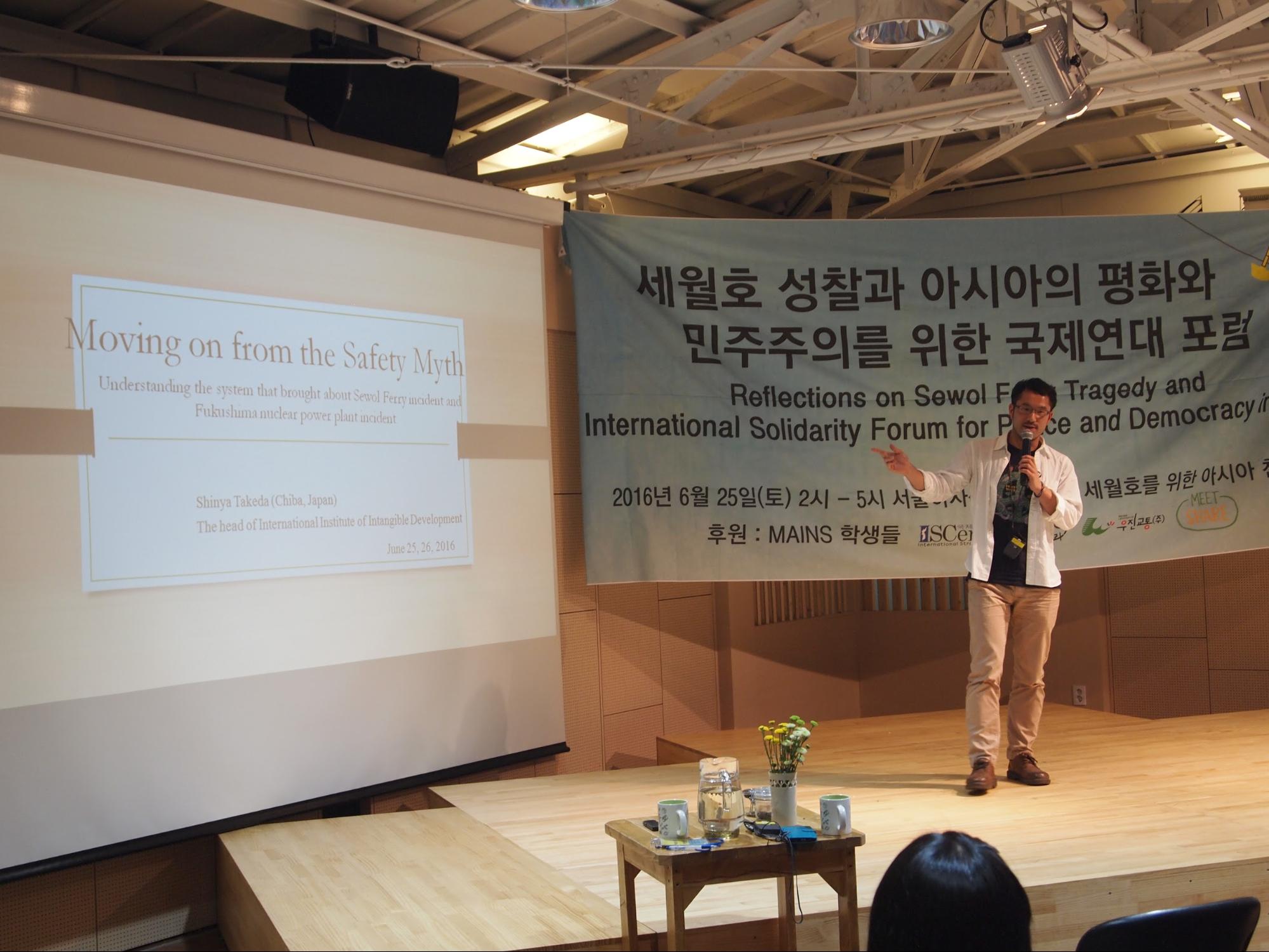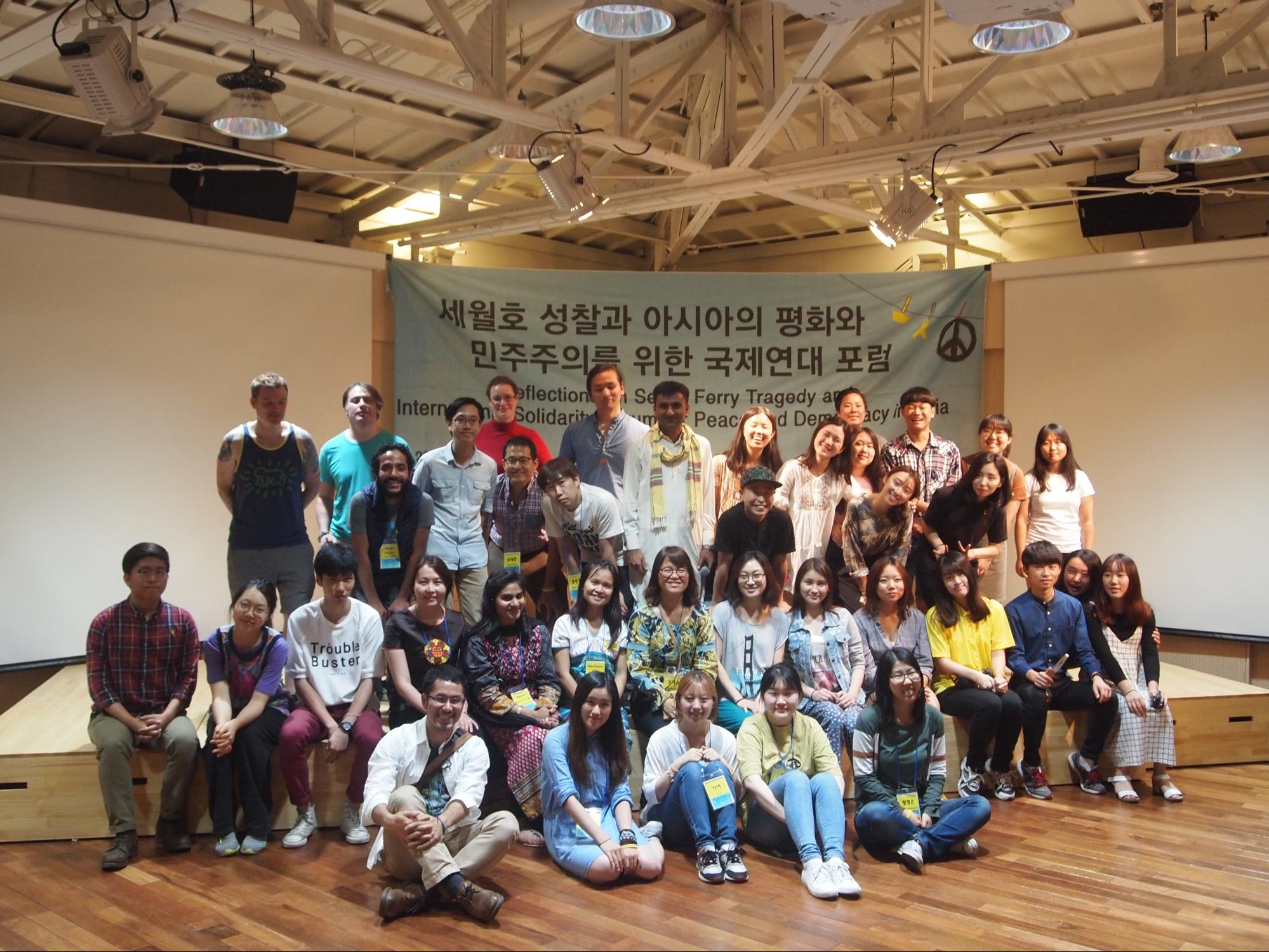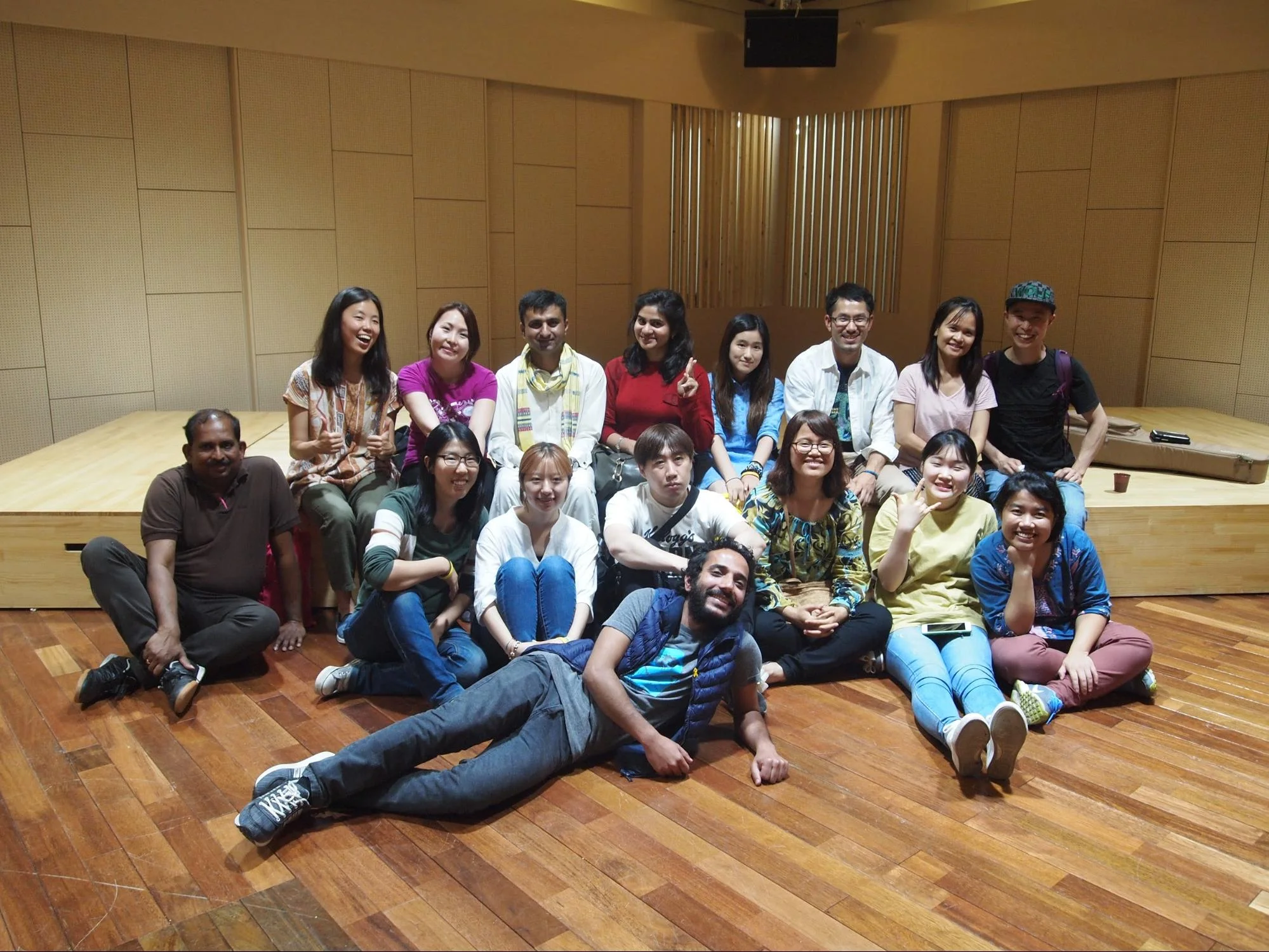ISC This Month
Reflections on Sewol Ferry Tragedy and International Solidarity Forum for Peace and Democracy in Asia
On June 25th, the 800th day of Sewol Ferry Tragedy, the Asian Friends of Sewol organized a forum connecting the Sewol Ferry Tragedy with other tragedies and issues around Asia. Participants had an opportunity to write postcards to the Sewol families, sign the petition demanding truth and revision of the special Law, and take a picture with a sign supporting these demands. Inside the forum hall, we sold Nepalese tea, Chia, to fundraise.
The forum started with an opening song by the Sungkonghoe University MAINS students from Myanmar, Nepal, Pakistan, Mongolia, Thailand, Sri Lanka, and Korea. Then Yoo Kyung-geun, father of Danwon high school student Ye-eun and leader of the 416 Sewol Families for Truth and A Safer Society gave the opening remarks. He explained how the 416 Sewol Families was established to reveal the truth, demand the punishment of those responsible, and a fundamental solution to prevent repetition of the tragedy. During the past 26 months the families were able to pass a Special Law which created a Special Committee to investigate the truth. However, the government has been uncooperative even obstructing the investigation. On October, an international conference will be held to demand a standard system for victims of disasters or tragedies so that everyone can receive equal and fair treatment regardless of nationality, race, or gender.
The first presentation was by Naw Yuzana Thinn from Myanmar. She compared Myanmar’s Cyclone Nargis in 2008 with the Sewol Ferry Tragedy. She explained that while the cyclone was a natural disaster, the government's failed response turned it into a man-made one. Not only had the military government ignored warnings from a climatologist before the disaster, but it also had neglected its responsibilities after the disaster such as providing relief supplies or distributing international relief supplies. Therefore, social trauma from the disaster and its handling prevailed through society. Likewise, after the Sewol Ferry Tragedy, surveys showed that the level of social distress increased drastically a year after the tragedy. So she suggested solidarity in demanding that the governments carry out their responsibilities and roles, remember the incident and victims by keeping records, and recover social empathy.
After the first presentation, Namrata Funda Parvaiz recited the poem "Ma" to commemorate the victims of all disasters. In the poem, a son tells his mother that he will always be with her.
Niwash Gautam presented on child trafficking in orphanages in Nepal. Nepal has lots of orphanages with kids from poor families. The owners keep the children but actually some of them use the children to earn money. Even though the government and the related institutions are aware of this problem, corruption makes them overlook it. The government neglects its responsibilities and focuses more on economic development and profits. That is the core cause of child trafficking Nepal and the Sewol Ferry Tragedy.
Afterwards, two students from an alternative school and one university student shared their personal testimony about the Sewol Ferry Tragedy. They were almost the same age as the High School students killed in the Sewol Ferry Tragedy. They shared the shock they felt when they learned news of the accident and their anger when they witnessed the government's response and mainstream media coverage. This has fueled their desire to support the struggle and fight for a better society.
The last presentation was done by Shinya Takeda. He explored the meaning of development through the Fukushima Nuclear Meltdown and the Sewol Ferry Tragedy. Even though the nuclear meltdown was caused by an earthquake and tsunami, it was also caused by a money-oriented society. To prevent the future disaster, he suggested redefining development with the more holistic "intangible development" that would allow groups, communities and nations to define their future in a holistic and integrated manner, stressing values such as participation, transparency and accountability.
The last activity was composing and performing a song together to show support and heal each other through music. Everyone - presenters, participants, Sewol families, and staffs - formed a big circle then started by playing a rhythm followed by singing.
The forum finished with remarks from the Sewol Families. Park Ye-na, the sister of a victim, said, "Although 2016 is the world with a lot of convenience, people do not make effort to live together or have compassion for others. We should not stay silence simply dismissing another person’s problem as their business. If someone's rights were infringed or lives were taken, we should act. We should show solidarity to each other and protect valuable lives."
Also Choi Yu-na, a sister of a victim, said, "We can keep democracy only when we make our voice heard. I realized this fact after I lost my brother. So I try to overcome my personality and let people know what is wrong. If democracy can be ignored in Korea, it can happen everywhere else. I hope everyone, regardless race and nationality, has interests in keeping a valuable democracy."
Lastly, Im Young-ho, an uncle of a victim, said "We are all in Sewol Ferry. I dream a day when we can ride safe Sewol ferry and live together."
Asian friends of Sewol prepared for the forum for over a month. Below are some of their reflections. Even though there was a language barrier, we never stopped communicating and we became "WE" through the preparations.
"I joined the Asian Friends of Sewol to keep my promise that I would not forget Sewol Ferry Tragedy. I will cherish this valuable memory and remember what the victim's sister said about democracy. I will keep my interests in protecting democracy." - Bo-
"Even though we cannot communicate fully, I think the peace may be the hope for us [in this conference] to drink tea in rainy or hot summer days." - Jeje-
"While I prepared for the forum, I thought about 'Solidarity' more. Attending a travel alternative school, I had heard that word many times. I think I witnessed a larger scale of solidarity." -Sol-
"I like the programs of the forum and I am grateful to have a chance to give my testimony in front of people and the victims' families." - Jaya-
"At first, I thought I would like to help the victims' families even a bit, but I heard what victims' families said and realized they are not fighting for themselves but for all of us." - Won Jong-il-
“May our little deeds and efforts becomes the testimony. We all are justice seeking people, Let's move forward together! “ -Namrata Funda Parvaiz-
“This is my first time of learning the tragedy outside my country deeply and I realize that every human being has the same feeling and response regardless of nation, age, sex, rich or poor. -Naw Yuzana Thinn-
As someone in the field of child right advocacy in Nepal, it was a good experience for me to put forward my perception on the roles and responsibilities of concerned governments in both child trafficking to orphanages in Nepal and Sewol Ferry disaster in South Korea. -Niwash Gautam-
We discussed the reasons of our pain, which was similar, and we gave hope to each other that dark days will last no longer. There will be a bright day. A day of hope, a day of peace in Asia.-Hassan Rind-
I hope that this event can be a small starting step of people in Asia to take time to talk and reflect on a Asia together. In solidarity! - Lalita Nim-
Everyone took extra measures to build network to bring audience to this event. It is a good exposure for our group. We have built valuable professional network in the community. In the future, everyone can benefit from this. -Selvakumar Sivanathan-
A Night With the Venezuelan Ministry of People’s Power of External Trade and International Investment and Vice-Minister of People’s Power for Industry
On Monday, June 27th, there was an encounter with Jesus Faria, the Venezuelan Ministry of People’s Power of External Trade and Carlos Faria, International Investment and Vice-Minister of People’s Power for Industry. It was the time that we could hear the real situation of Venezuela, not distorted or even false information from mainstream media. After Chavez took office as the president there were a lot of social changes and the current government is trying to continue in the same direction. The opposition party, having the US on their back, won the general election last December and has attempted to overthrow the government. There are problems needed to be solved, but the opposition party and the rich are causing economic crisis and using the situation for their political end while the people are suffering from it. In addition to it, the US tries to shake Venezuela from outside. However people who support the government come out to streets and let people know the truth and other Latin American countries show their solidarity to Venezuela within the Organization of American States to check the US.
Jesus Faria, the Venezuelan Ministry of People’s Power of External Trade, said that the first six months of 2016 was one of the most difficult time, but he has confidence to continue the revolution under the harsh condition. To make that happen, they will have strong political power, overcome food crisis, and increase domestic production to control inflation. Also the government has every intention to communicate with the opposition to solve the problems.
June Open Lecture: Nonsan Summer Farming Exposure Trip
For June Open Lecture, we went to Nonsan to experience farming. Nonsan is famous for strawberry. During 2 days and 1 night, we worked in the field during day and talked with farmers in the evening. Arriving Nonsan and went to the strawberry greenhouses right after lunch. It is not the time for harvesting strawberries, we cut “runner” that will be growing strawberry seedling and put them into the bags. While we were cutting the runners from the mother strawberries, we could pick and eat as many as we could. After working a few hours and took a rest under the shade with watermelon and korean wine, Makgeoli. Then we went back to work. Coming back to the accommodation, the dinner seemed more delicious than usual after hard working. The president of the farmer’s organization in Nonsan came to join the dinner and we could hear about farming life and farmers’ struggle.
The next day, we went to the field cultivated with native seeds. Before starting working we were told about the native seeds and planted native peas and perillas in the field. Surrounded by mountains and green field, we could also hear women peasant life. For women peasants, struggle against sex discrimination also big agenda in the strong patriarchal rural communities.
It was only 2 days and 1 night but we could have glimpse of farmers’ lives and experience how agricultural crops were cultivated.









